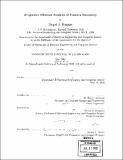Projective minimal analysis of camera geometry
Author(s)
Romano, Raquel Andrea
DownloadFull printable version (11.29Mb)
Alternative title
Projective nonlinear minimal analysis of camera geometry
Other Contributors
Massachusetts Institute of Technology. Dept. of Electrical Engineering and Computer Science.
Advisor
W. Eric L. Grimson and Olivier D. Faugeras.
Terms of use
Metadata
Show full item recordAbstract
This thesis addresses the general problem of how to find globally consistent and accurate estimates of multiple-view camera geometry from uncalibrated imagery of an extended scene. After decades of study, the classic problem of recovering camera motion from image correspondences remains an active area of research. This is due to the practical difficulties of estimating many interacting camera parameters under a variety of unknown imaging conditions. Projective geometry offers a useful framework for analyzing uncalibrated imagery. However, the associated multilinear models-the fundamental matrix and trifocal tensorare redundant in that they allow a camera configuration to vary along many more degrees of freedom than are geometrically admissible. This thesis presents a novel, minimal projective model of uncalibrated view triplets in terms of the dependent epipolar geometries among view pairs. By explicitly modeling the trifocal constraints among projective bifocal parameters-the epipoles and epipolar collineations-this model guarantees a solution that lies in the valid space of projective camera configurations. We present a nonlinear incremental algorithm for fitting the trifocally constrained epipolar geometries to observed image point matches. The minimal trifocal model is a practical alternative to the trifocal tensor for commonly found image sequences in which the availability of matched point pairs varies widely among different view pairs. Experimental results on synthetic and real image sequences with typical asymmetries in view overlap demonstrate the improved accuracy of the new trifocally constrained model. (cont.) We provide an analysis of the objective function surface in the projective parameter space and examine cases in which the projective parameterization is sensitive to the Euclidean camera configuration. Finally, we present a new, numerically stable method for minimally parameterizing the epipolar geometry that gives improved estimates of minimal projective representations.
Description
Thesis (Ph. D.)--Massachusetts Institute of Technology, Dept. of Electrical Engineering and Computer Science, 2002. Includes bibliographical references (p. 115-120).
Date issued
2002Department
Massachusetts Institute of Technology. Department of Electrical Engineering and Computer SciencePublisher
Massachusetts Institute of Technology
Keywords
Electrical Engineering and Computer Science.